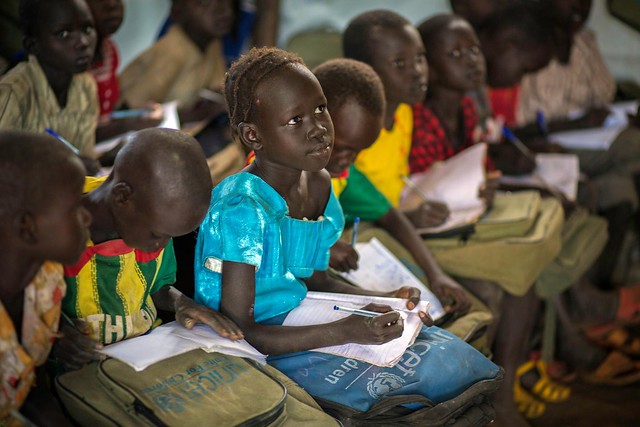Charlene Thompson

Gambella, Ethiopia – 14 November, 2014: Visitors to the grade one classes in the Kule Refugee Camp are often welcomed with a joyful song by the children in their native Nuer language. The song is about their right to an education and the students enthusiastically sing and clap along. In one of these classrooms there is one voice that rises over all of the other voices and immediately draws attention in its direction. It’s the voice of 13 year old Nyabol Lual. A slim, shy adolescent girl with a bright smile.
Holding a pencil and a ruler in her hands, Nyabol explains that she started school in the Kule Refugee Camp in July, one month after she arrived in Gambella, Ethiopia with her mother and her four siblings. After her father was killed in the conflict in South Sudan, her mother led the family on foot from the Upper Nile Region in South Sudan to Ethiopia. Nyabol was enrolled in school in South Sudan but her classes were interrupted by the fighting and she had to stop her education.

“I like school very much and English is my favourite subject,” she says. Nyabol is one of 24,991 refugee children (10,996 girls; 13,995 boys) now enrolled in school in grades 1-4. A recent ‘Back to School’ campaign in September for the academic year 2014-2015 registered over 18,000 students in Kule and Tierkidi refugee camps. The opening of schools and the campaign to register children in the camps is the result of strong partnerships between Ethiopia’s Administration for Refugee and Returnee Affairs (ARRA), UNHCR, UNICEF and NGOs such as Plan International, Save the Children International and World Vision. “In addition to the life-saving services provided in the camps such as nutrition and clean water, it is important that we also give children the opportunity to go school,” says Mr. Daniel Ayele Bezabih, Head of Programme Implementation and Coordination, ARRA. “The partnership between ARRA, UNHCR, UNICEF and other NGOs has ensured that children in the camps can access education and continue to learn,” he adds.
To ensure children could go to school, ARRA; UNHCR and partners such as UNICEF had to allocate land in the camps for the schools; construct classrooms; identify and train teachers from the refugee community; develop a curriculum; and provide learning materials for teachers and students. Once all of this was in place, a door to door campaign was conducted to register children in school. “In an environment such as this where so many basic requirements need to be met and services provided to so many people so quickly; strong partnerships are key to the overall success,” explains Mr. Shadrack Omol, Chief of Field Operations, UNICEF Ethiopia. “The partnership between UNICEF, ARRA and UNHCR in education highlights such strength” he adds. UNICEF leads the cluster coordination for education in Gambella.
Mr. Daniel also acknowledges the importance of effective partnerships which he says was demonstrated when the Leitchuor and Nip Nip refugee camps and the Matar border entry point were flooded from June to October, displacing thousands of refugees. When the rainy season arrived and flooded the camps, thousands of refugees had to be accommodated within host communities. The regional government in Gambella opened its health facilities to the refugees and ARRA, UNHCR, UNICEF and other partners came together to ensure refugees and the host communities were able to access clean water, proper sanitation, health, nutrition, education and protection services.
Since the conflict started in South Sudan in December 2013, more than 190,900 refugees have crossed into Gambella, Ethiopia. Approximately 90 percent of the refugees are women and children. The Ethiopian Government maintains an ‘open-door’ policy towards refugees in keeping with international commitments. This has required robust coordination and effective and efficient partnerships to meet the needs not only of the refugees but also the host communities in Gambella which has also been greatly affected by the very rapid increase in population size. “The Government’s policy is when a refugee camp is established, the host community must also benefit from the services provided,” says Mr. Daniel.

In Akula, refugees are settled together with the host community. Humanitarian partners and regional government have scaled up the provision of services to be used by the host community and refugees. Refugee children attend school with children from the host community. UNICEF is support the humanitarian partners to build a new school in Akula and will provide teaching and learning material for all the children that will be attending the school. “The host communities are incorporated into the planning and implementation of our activities in response to the refugee situation in Gambella and it’s through good working relations with all partners that this is being done,” explains Mr. Daniel.
Back at school in the Kule Refugee Camp, Nyabol says she loves to come to school because she is learning many subjects. She dreams of becoming a doctor in the future so she can help other refugees like herself. For Mr. Daniel, Nyabol’s story represents the overall goal of ARRA, UNHCR and its partners. “Supporting refugees so they can not only sustain their lives but also thrive is success for ARRA,” he says.
